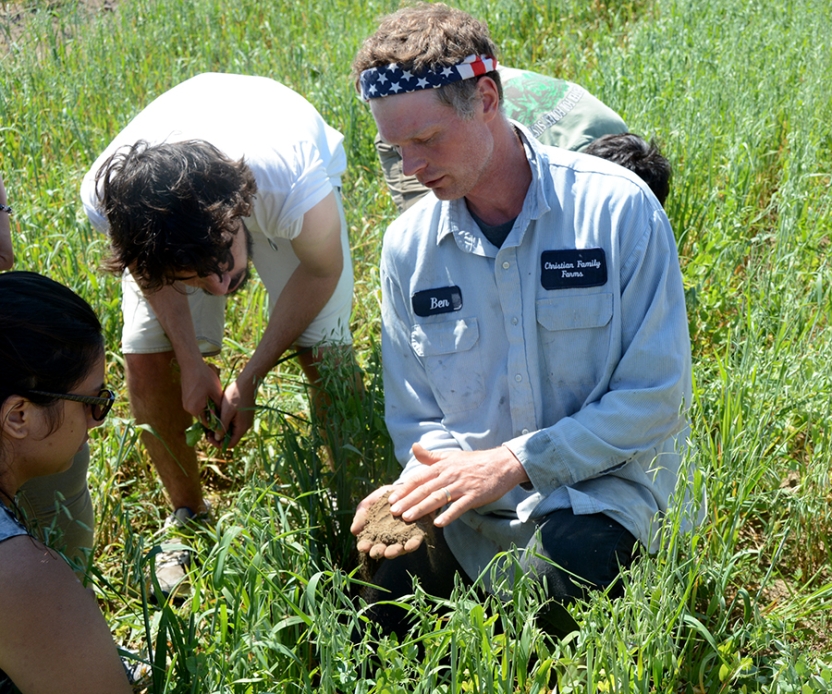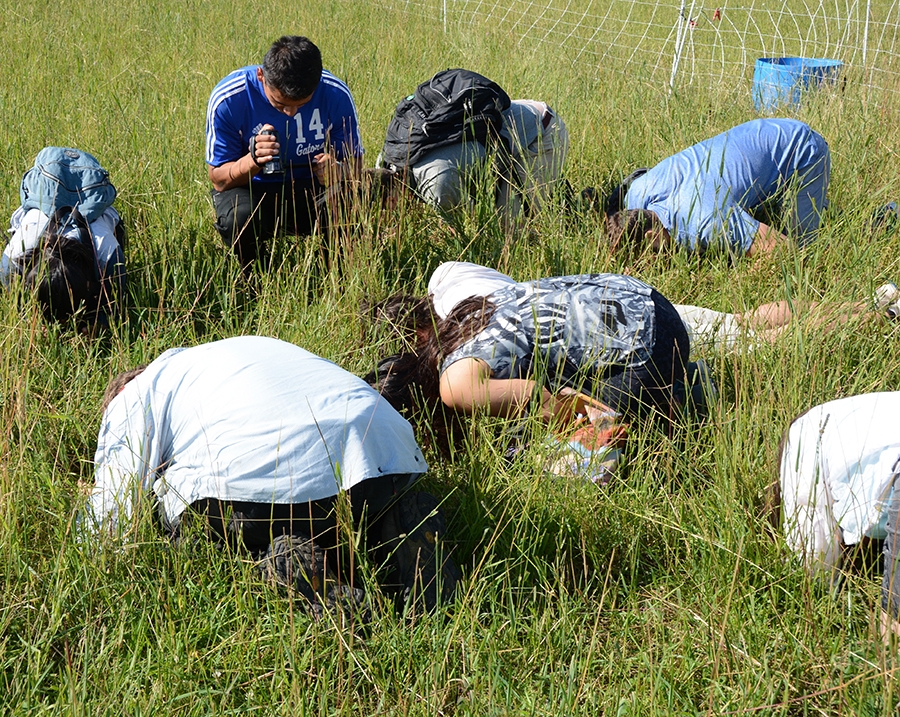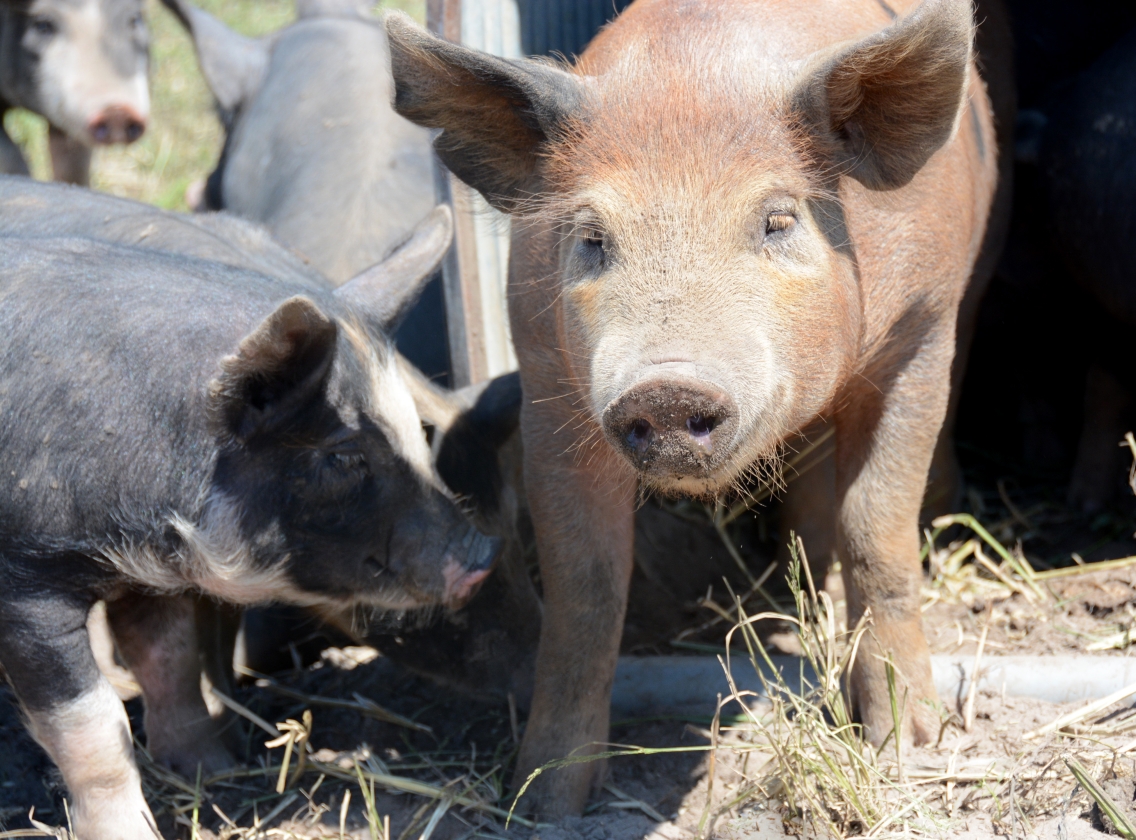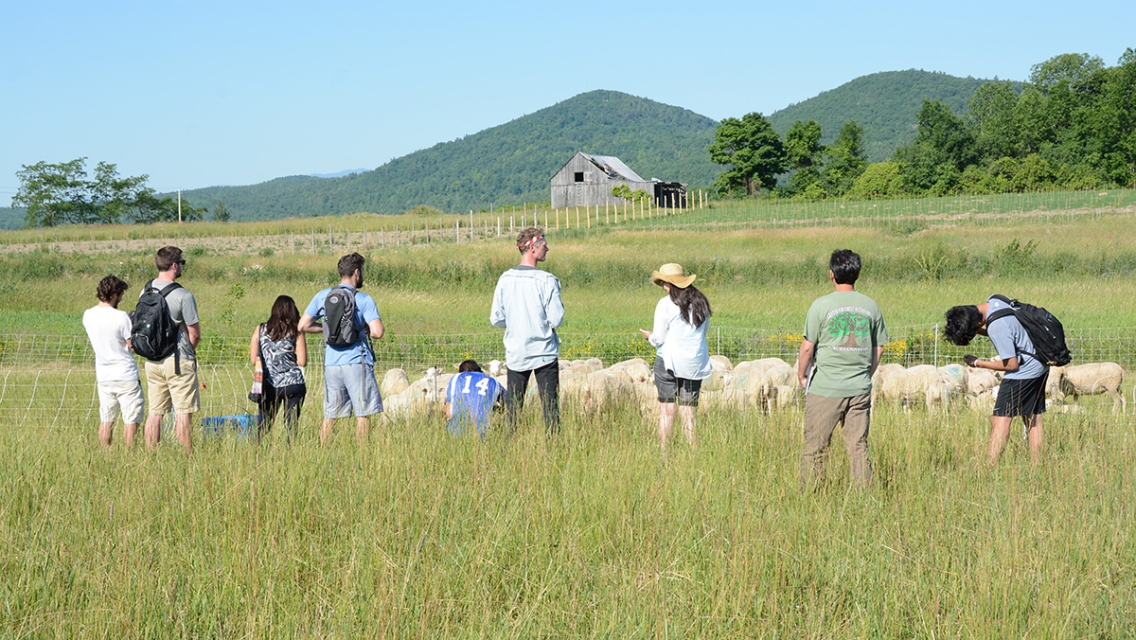School of the Environment Students Tour "Full-Diet CSA" Farm

Nine students from Middlebury’s School of the Environment visited Essex Farm in upstate New York on the 4th of July. The farm produces enough meats, dairy products, fruits, and vegetables, in addition to flour, herbs, and maple syrup, to support approximately 300 members 52 weeks a year. It purports to be the first “full-diet CSA” in the country.
ESSEX, N.Y. – It’s half past eleven when Mark Kimball’s cell phone rings for the first time all morning. The co-owner of Essex Farm, who has been up since 4 a.m., is excited because his financials from the previous week are just now coming in. He takes the call and promptly shares the data with the Middlebury School of the Environment students who have spent the past three hours dashing from pasture to pasture across Mark and Kristin Kimball’s 1,100-acre farm overlooking Lake Champlain in Essex, N.Y.
There are few secrets in the farming business, and for the students in Curt Gervich’s environmental systems course, the phone call about the farm’s revenue, expenses, debt, and more, is the perfect capstone to the day. Because for the rest of the week the students are sketching “causal loop diagrams” and discussing the farm’s social and ecological systems as an organizing principle for the environmental challenges, and financial reality, of operating a year-round CSA farm in the North Country.
Mark Kimball has been a congenial, if frenetic, host for the morning. From the moment the students stepped off their 15-passenger Middlebury van, Kimball has kept them on their toes. For starters he showed them where to pick strawberries, advised them to stay hydrated, and led them on a jog up N.Y. Route 22 to witness Essex Farm’s chicken- and sheep-raising operations, both of which take advantage of moveable pens so the animals will enjoy fresh grazing and fertilize a new location every week.

The students followed Kimball’s lead, crossed the road, and poked their faces deep into the fertile ground. “This is sandy silt loam,” Kimball said grabbing a handful, smelling it, and putting some in his mouth. “You could grow anything you want in this soil. This is the canvas and each farmer brings his or her own artistry to it.”
At nearly every stop on this morning’s five-mile tour d’farm, the towering host encouraged the students to taste the grass, the crops, the roots, and even the feed he gives his animals. There isn’t anything on this farm that will hurt you, Kimball said, except perhaps for the poison parsnip.
Next they jogged through acres of sugar bush before arriving at a pasture overlooking the lake where rows upon rows of onions, garlic, kale, peas, soybeans, potatoes, corn, and other crops were growing. Along the way they stopped to admire beef cattle and draft horses, tiptoed around a wheat field, and had an intimate visit with the farm’s drove of pigs.
Interspersed between stops were conversations about the meaning of sustainability, how mammary glands produce milk, the significance of nitrogen-fixing rhizobia in the soil, and how farmers need to challenge their own assumptions.
Kristin and Mark Kimball started the farm in 2003 and now operate a successful year-round CSA share program for hundreds of members in the Essex area. And unlike most community-supported agricultural networks, the Essex Farm CSA is “free choice” operation, which means that members come to the farm on Fridays and are permitted to “take what they need for the week, in any quantity or combination they choose.” Members are even encouraged to take extra produce during the growing season for freezing or canning, thus their motto: “One farm – all your food.”

This is the second summer that Curt Gervich has taken his School of the Environment students to Essex Farm because “it brings the concept of social-ecological systems alive. As we walk the farm the interrelationships among vegetable production, livestock, ecological factors such as sunshine and rain, and people are highly visible.”
The professor’s goal is to encourage students “to see their environment as a series of systems that integrate social and ecological elements, and to use the systems view to manage their environment for sustainability.”
One of the students in the class, Daniel Ramirez from Texas, said, “The success of Essex Farm is not only a testament to the possibility of fully sustainable living, it is a testament to the power of humility and genuine curiosity.” Ramirez, a Middlebury undergraduate, appreciates Mark Kimball’s “activity-oriented view of learning and the love he has for farming.”
Maria Celes Lasaca Abragan, a School of the Environment student from the Philippines, was impressed how the CSA concept “gives people the opportunity to buy local, high-quality foods directly from the farmer.” Each CSA creates a relationship between the farmer and the consumer that is “quite important in these days when the landscape of food has become way too complex and distant from our personal senses,” she says.
In an effort to expand, Essex Farm recently began offering its CSA on a farm-to-door basis to residents of Manhattan. Every Wednesday its members in New York City receive a combination of products of their own choosing simply because, as Mark Kimball said, “change is the one constant in farming. Every day I wake up and question my own assumptions about what I have to do today,” even if that means expanding his operation to an urban center 280 miles from his farm.

– With reporting and photography by Robert Keren

